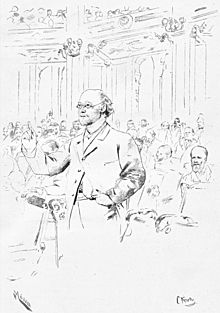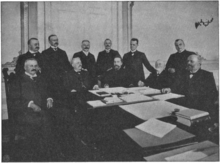Carl Berner
Carl Christian Berner (born November 20, 1841 in Christiania ; † May 25, 1918 ibid) was a Norwegian politician .
Life
His parents were the judge at the Stiftsobergericht Oluf Steen Julius Berner (1809–1855) and his wife Marie Louise Falkenberg (1816–1841). On July 14, 1868, he married Olivia Mathilde Jacobine Berner (May 7, 1841– May 11, 1919), daughter of master tanner Jørgen Haslef Berner (1811–1892) and his wife Jørgine Smith (1808–1887).
Carl Berner was an orphan from an early age. The mother died shortly after he was born, the stepmother when he was eight, the father when he was 14. After that he lived with his maternal family in Larvik for a while . He passed the examen artium in 1859. He then began studying science in Christiania, but never finished it. Instead, he taught at various high schools. He took an active part in student politics and was chairman of the student union from 1867 to 1868. During this time he joined the national-democratic opposition and was also a member of the "Døleringen", which had taken simple country life as the model of their lifestyle.
After studying abroad, he became rector of the new Technical University in Bergen in 1874. There he soon became politically active and was a member of local self-government. In the early 1880s he took part in the political clashes on the Venstre side . From 1886 to 1891 and from 1895 to 1903 he was Storting's delegate for Bergen and from 1903 to 1909 for Sarpsborg . He remained a member of the Storting until 1909 with the exception of the period from 1892 to 1894, when he was a State Councilor in the government and therefore not eligible for the Storting. In 1899 he was also the administrator of the stamp paper . From 1886 to 1889 he was president of the Odelsting .
In the session of the Storting from 1889 to 1891 he was the parliamentary leader of the “pure Venstre” because their actual leader Johannes Steen had failed in the 1888 election. Although he was an able parliamentarian, he was not held in high esteem during the schismatic period within Venstre. But he was still the point of contact for the eliminated “moderate Venstre”. He could therefore take on the role of mediator.
Karl Berner showed his skill when it came to freeing the Venstre from the dilemma, which consisted in the fact that they no longer had confidence in Johan Sverdrup , but did not want to overthrow him with the help of the right ( Høyre ). When Høyre made a motion of no confidence in 1889, Berner made such harsh conditions to support a reorganized Sverdrup government that the king preferred to dismiss the government and instead entrusted Emil Stang with the formation of a government.
Two years later there was a government crisis caused by "Berner's agenda", which he presented to Storting, which on February 23, 1891, accepted the motion. It was a landmark in Norway's parliamentarism and Union politics. The adoption of the agenda included the call for Norway's own foreign minister. The agenda was directed against a joint proposal by Emil Stang and the Swedish government. It provoked the vote of confidence in Stang, which for the first time led to a case of a parliamentary government through a vote in Storting. He was neither the originator of this new line, nor the author of the proposal, but the final editor, who succeeded in cleverly phrasing the conflicting interests of the Venstre factions, "pure" and "moderate" ones.
In the government of Johannes Steen , which followed Stang's government, Berner was first a member of the State Council Department in Stockholm, then State Councilor of the Department of Churches and Education. However, he did not perform any special services there. His field was the dispute in Storting. Both as a State Councilor from 1891 to 1893 and in Storting, he consistently represented the line in Union policy that was outlined in “Berner's agenda”: In addition to the long-term goal of having his own foreign minister, he initially pursued the goal of having his own consulate for Norway. In January 1903, the Storting decided on a new "Berners agenda" for the final phase of the Swedish-Norwegian negotiations in the consulate dispute. Berner played a central role when, in 1905, as President of the Storting, which he had become in 1898, in a special committee he prepared the Norwegian approach to the consulate matter that led to the dissolution of the Union. The high point of his political career was when he proclaimed the dissolution of the Union on June 1st from his place as President of the Storting. During this time he was also a member of the Lagting . He then took part in the Karlstad negotiations, in which the modalities of the separation from Sweden were worked out.
Carl Berner was chairman of the Venstre parliamentary group for several sessions. However, he did not have a prominent position within the party until he became chairman in 1903. With his moderate negotiating skills, he saved the Venstre from collapse, but had no ambitions to take on a leadership position in the internally split party after 1906. His efforts to find a compromise with the Michelsen government largely isolated him from the party that largely followed Gunnar Knudsen's opposition course . In 1909 he lost the election in his constituency "Nedre Romerike " and withdrew from politics.
Outside of politics he also had some important functions: he was a member of the board of directors of the Nansen Fund , of the Nobel Committee of Storting and of the Association for the Preservation of Norwegian Antiquities. He was also the first chairman of the Nordmannsforbund.
He received the Grand Cross of the Order of St. Olav , the Grand Cross of the French Legion of Honor, the Coronation Medal and the June 7th medal.
He was buried in Vestre Gravlund in Oslo.
Offices
- 1886–1888: 4th delegate for Bergen (Venstre); Member of the Railway Committee
- 1889–1891: 1st delegate for Bergen (Venstre); Member of the railway committee; Member of the election committee.
- 1891–1892: State Council in Stockholm
- 1892–1893: Council of State in the Church and Education Department.
- 1895–1897: 1st delegate for Bergen (Venstre); Member of the customs committee; Member of the election committee.
- 1898–1900: 3rd delegate for Bergen (Venstre); Director of the technical school; Member of the customs committee; Member of the election committee.
- 1900–1903: 2nd delegate for Bergen (Venstre); Stamp paper administrators; Member of the constitutional committee; Member of the Grand Budget Committee; Member of the election committee; Member of the fullmakts committee.
- 1904–1906: 1st delegate for Sarpsborg (Venstre); Stamp paper administrators; 1905–1906 Chairman of the Constitutional Committee; Member of the fullmakts committee; Member of the election committee.
- 1907–1909: 1st delegate for Sarpsborg (Venstre); Stamp paper administrators; Chairman of the Constitutional Committee; Member of the preparatory fullmakts committee.
Remarks
The article is essentially based on the Norsk biografisk leksikon . Any other information is shown separately.
- ↑ The judicial districts of the higher courts were identical to the diocese borders (diocese = monastery).
- ↑ The "Examen artium" was the regular entrance examination for university, which required knowledge of Latin and Greek. So it corresponded to the Abitur, but was accepted by the university until 1883.
- ↑ "Døleringen" was a group of radical academics who rallied around AO Vinje , who published the magazine Døle (valley dwellers, simple, uncouth people) with almost exclusively their own texts, which were written in a Danish-Norwegian mixed language, but later joined borrowed the language of Ivar Aasen . They raved about the simple country life. The circle included Carl and Hagbard Berner , Hans Ross , Ernst and Ossian Sars, and now and then Ivar Aasen .
- ↑ a b c KV Hammer: Carl Christian Berner . In: Christian Blangstrup (Ed.): Salmonsens Konversationsleksikon . 2nd Edition. tape 3 : Benzene Derivatives Brides . JH Schultz Forlag, Copenhagen 1915, p. 68 (Danish, runeberg.org ).
- ^ State Council was the name for the Norwegian ministers.
- ↑ The Fullmakts Committee checked whether the delegates had been properly elected.
- ^ Carl Christian Berner . In: Biografier 1905–1945 ; Retrieved February 23, 2010.
literature
- KV Hammer: Carl Christian Berner . In: Christian Blangstrup (Ed.): Salmonsens Konversationsleksikon . 2nd Edition. tape 3 : Benzene Derivatives Brides . JH Schultz Forlag, Copenhagen 1915, p. 68 (Danish, runeberg.org ).
- Leiv Mjeldheim: Carl Berner . In: Norsk biografisk leksikon .
| personal data | |
|---|---|
| SURNAME | Berner, Carl |
| ALTERNATIVE NAMES | Berner, Carl Christian (full name) |
| BRIEF DESCRIPTION | Norwegian politician, member of the Storting |
| DATE OF BIRTH | November 20, 1841 |
| PLACE OF BIRTH | Christiania |
| DATE OF DEATH | May 25, 1918 |
| Place of death | Christiania |

